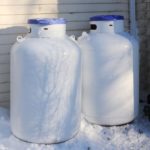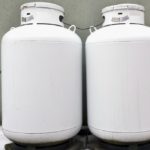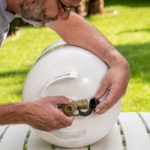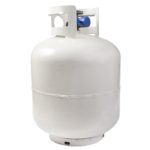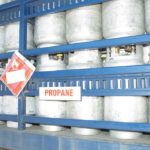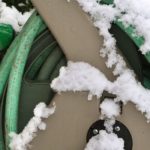Winter seems to make most things freeze, and that’s why many homeowners would rather keep their precious propane tanks indoors. Still, there’s no denying that outdoors is the best place to keep your tank, especially for safety purposes. So the question is: Can propane tanks freeze if left outside in the winter?
Propane tanks can freeze if left outside in the winter. Frozen tanks can get so cold that they can’t be used until they’re warmed up. This isn’t a safety concern, but it may mean the tank has lower pressure than usual or, depending on how cold it is, it may not work at all.
While we’re talking about propane tanks freezing up, you might also want to know if the propane itself can also freeze. The answer is technically yes, but it’s not likely to happen in your tank. Let’s look into these questions so that you can stay safe and warm throughout the year.
What Is the Freezing Point of Propane?
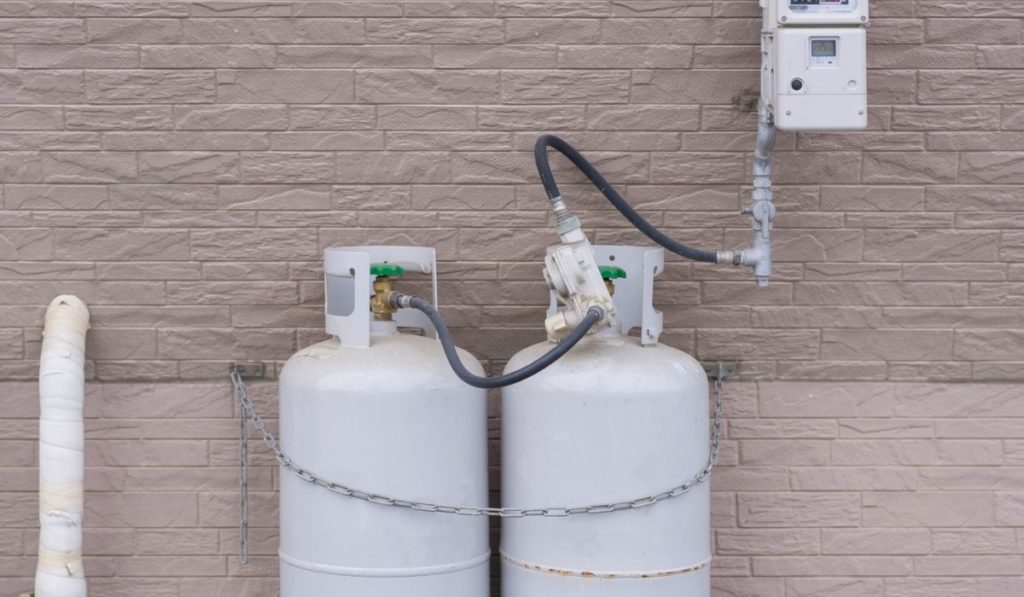
In theory, propane can freeze. However, that’s hardly possible, as propane liquid can only freeze at a temperature of -306° Fahrenheit, which is 200° colder than the lowest temperature on record. So you can say that propane can freeze in a laboratory setting, but it won’t freeze under real-life conditions.
However, frost and ice can form on cylinders, regulators, and delivery lines in extreme conditions, which can affect propane transmission, storage, and regulation. Even though this occurs at some temperatures, it rarely affects system performance or functionality.
Why Does Propane Freeze?
Within the tank, propane exists as a liquid, and it then gets released through a valve as gas. If the temperature inside the tank drops below -44˚F, the propane stays in its liquid form and doesn’t vaporize.
This makes it impossible for appliances that rely on propane to get the gas necessary to function. In extreme conditions, the propane can also undergo large pressure fluctuations while it travels through the propane delivery system, which can cause the tanks, valves, and regulators to freeze.
“Freezing” occurs primarily on pressure regulators, which reduce propane’s pressure to the point where appliances and equipment can hardly use it. Upon expansion as gas and at boiling point, liquid propane typically freezes the surrounding humidity. There is no need to worry about this sort of freezing.
On rare occasions, however, propane may “freeze” and remain liquid in the regulator as it passes through it. Most of the time, this results from an overfilled container preventing the propane from boiling and releasing vapor as the system demands fuel, or from a portable cylinder positioned at an angle that does not permit fuel to be drawn from the vapor space within the tank.
How to Prevent a Propane Tank From Freezing
At some point in most locations, the temperature will drop, which means your propane tank might be at risk of freezing. Now that you know that the freezing issue is really with the tank and not the propane itself, you need to know how to prevent the propane tank from freezing. You can achieve this by following the steps below.
Fill Up Your Propane Tank
You can protect your propane tank from freezing by keeping it full — it’s that simple. Rather than replacing your old tank with a new one, refill it more often. Not only will you save some cash, but it will also ensure that your tank doesn’t freeze up. In addition, you won’t waste propane if you fill up your tank before it becomes completely empty.
Increase the Pressure
Propane flow will be slower with colder temperatures since propane contracts as the temperature drops. As a result, your tank can “freeze up.” With a drop in temperature, liquid propane volume and pressure in your tank drop.
You can avoid low-pressure propane tanks in a variety of ways. One of them is to keep your tank full. Experts recommend that your tank should always be at least 30% full to maintain pressure in the tank.
Besides keeping your tank full, you can also avoid pressure problems by doing the following:
- Get rid of any snow on the tank and its regulator
- Keep the propane tank warm by using a heating blanket
- Ensure the tank stays in an upright position, never on its side
- Store your tank in a well-ventilated area
- Turn off the gas valve when the propane tank isn’t in use
Store the Tank Properly
Propane tanks should be set up in an area with plenty of ventilation and a cool temperature. You might be tempted to store your tank in well-insulated places like the basement or garage, but that might be too risky.
Instead, you should store the tank outdoors, in a well-shaded area, away from outdoor elements like rain or snow. If left exposed to these elements, it can cause your tank to freeze up and also lead to rusting, which might shorten the tank’s lifespan.
Note that propane tanks shouldn’t be stored at temperatures higher than 120°F and lower than -40°F. Temperatures outside that range are too extreme, and the best way to ensure the tank doesn’t reach either end of the spectrum is by keeping the tank away from direct contact with sunlight and getting rid of ice or snow on it. You can achieve this by paying close attention to how the tank is stored.
Keep the Tank Warm
Propane tanks stored outdoors may be exposed to freezing conditions, depending on where you live or work. That’s not the ideal situation — it’s likely to result in low tank pressure and cause you a lot of trouble. Thankfully, there are ways to keep your tank warm if you have to store it outside in cold seasons.
Keep the tank free of ice, snow, or sleet to avoid low pressure. When it snows, turn off the valves, regulators, and tanks immediately. This way, the pressure will stay intact, and your tank will be protected from rust and damage.
You can also keep your tank warm by using an insulated blanket or a heated blanket, depending on the amount of pressure you need. Whichever one you use will keep the tank warm and regulate pressure. One good heated blanket option is the Powerblanket (on Amazon).
Can a Propane Tank Be Left Outside in the Winter?

Yes, you can leave your propane tank outside in the winter. All you have to do is choose a safe spot outdoors, away from your home. You can also follow the storage tips above to keep the tank warm.
In addition to other storage tips, you should also store the tank on a flat and solid surface, somewhere devoid of moisture.


